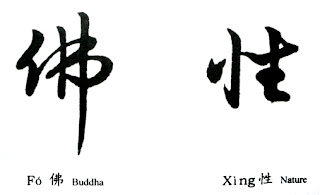"A greater reality exists that underlies the ordinary world of things and lives and minds. ... Some call it God or the Holy Spirit.... Others call it the ground of being, the impersonal essence that supports and sustains you. Still others call it emptiness, essential nature, Self, or Tao. Whatever they name it, this spiritual dimension is a sacred mystery that gives meaning, purpose, and truth to human life. In each person there exists something similar to, or even identical with, this greater reality. Here again, the traditions may disagree on the form this something may take. Christians call it soul, Jews refer to the divine spark within, Hindus call it atman, and Buddhists use words like Buddha nature or big mind. But all agree that this something connects us with the greater (or higher or deeper) reality that underlies ordinary life." - Meditation for Dummies (2006), p234.
"In each of us, the seed of Buddha, the capacity to wake up and understand, is called Buddha nature. It is the seed of mindfulness, the awareness of what is happening in the present moment." - Vietnamese Zen teacher Thich Nhat Hanh, The Heart of Buddha's Teaching (2008), p187.
"...to be a human being is to be a Buddha. Buddha nature is just another name for human nature, our true human nature. Thus even though you do not do anything, you are actually doing something. You are expressing yourself. You are expressing your true nature. Your eyes will express; your voice will express; your demeanor will express. The most important thing is to express your true nature in the simplest, most adequate way and to appreciate it in the smallest existence." - Japanese Soto Zen teacher Shunryu Suzuki, Zen Mind, Beginner's Mind (1995), p48.
"...if you know anything about Buddhism, you will know that the most important point is to be yourself and not try to become anything that you are not already. Buddhism is fundamentally about being in touch with your own deepest nature and letting it flow out of you unimpeded. It has to do with waking up and seeing things as they are. In fact, the word "Buddha" simply means one who has awakened to his or her own true nature. So, mindfulness will not conflict with any beliefs or traditions—religious or for that matter scientific — nor is it trying to sell you anything, especially not a new belief system or ideology." - Mindfulness teacher Dr. Jon Kabat-Zinn, Wherever You Go, There You Are (2004), p6.
"Traditionally, Buddhists are reluctant to talk about the ultimate nature of human beings. But those who are willing to make descriptive statements at all usually say that our ultimate essence or Buddha nature is pure, holy and inherently good. The only reason that human beings appear otherwise is that their experience of that ultimate essence has been hindered; it has been blocked like water behind a dam." - Mindfulness in Plain English (2002), p170.
"The Buddha said, “If you wish to grasp the meaning of ‘Buddha Nature’, just look at the conditions associated with the moment. Then, when the right moment arrives, Buddha Nature will manifest before your very eyes.”" - Japanese 'Soto Zen' Founder Master Eihei Dogen, Shobogenzo (Translated by Hubert Nearman, 2007), p248.
"The Sutra of Ten Stages says, "in the body of mortals is the indestructible buddha-nature. Like the sun, its light fills endless space, But once veiled by the dark clouds of the five shades, it's like a light inside a jar, hidden from view."" - The First Zen Patriarch Bodhidharma (early 5th century AD), Breakthrough Sermon.
"Eradicating the true and eradicating the false, one sees the buddha-nature." - 6th Zen Patriarch HuiNeng (638–713), Translated by John R. McRae, The Platform Sutra of the Sixth Patriarch (2000), p49.

"Since we are Buddha-nature or truth, we know that joy is our birthright. Where is it? It’s waiting for us in the very practice we’re talking about. Only through such practice can we move into joy or true commitment in our work, in our relationships, in all of our life." - American Zen teacher Charlotte Joko Beck, Everyday Zen (1997), p196.Last week my traditional Chinese Insight Calligraphy teacher, Paul Wang, taught me how to write the characters for Buddha Nature: 佛性 (fó xìng). Here is his rendering in old cursive (zhāngcǎo 章草):
This is his rendering of the same characters in the more fluid later cursive style:
 |
| The traditional Chinese calligraphy characters for Buddha Nature in Later Cursive Style (zhāngcǎo 章草) - written by the author. |
It seemed that I had made some progress. I wondered whether this was just a lucky fluke, or whether my mindfulness meditation had allowed something deeper to shine through. Not all my attempts were like this - repetition of this process every time is the real art.
"Our true nature—buddha nature—is always there. It’s always undisturbed. It’s present. We recognize that we are just fine once we get in touch with it." - American Zen teacher Charlotte Joko Beck, Nothing Special - Living Zen (1995), p211.


No comments:
Post a Comment